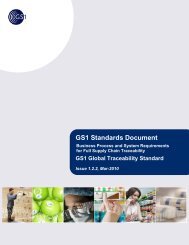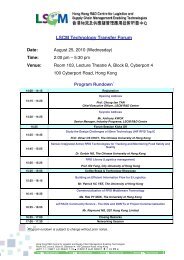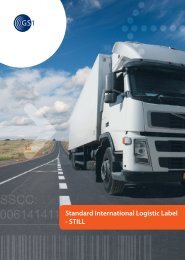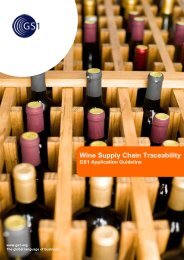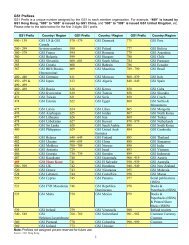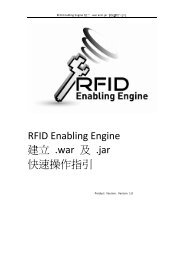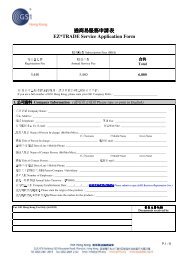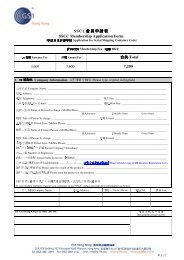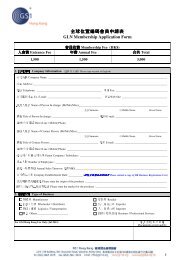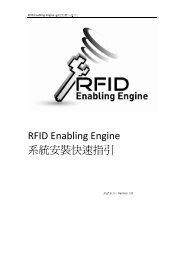ECR AP - GS1 Hong Kong Supply Chain Management
ECR AP - GS1 Hong Kong Supply Chain Management
ECR AP - GS1 Hong Kong Supply Chain Management
You also want an ePaper? Increase the reach of your titles
YUMPU automatically turns print PDFs into web optimized ePapers that Google loves.
13<br />
Russia is on the way<br />
to Electronic Documents<br />
Interchange<br />
Russia has long been the only European country in which the law<br />
did not allow the creation of legally significant invoices in electronic<br />
form.<br />
May 23, 2012 - the date of formal entry into force of the last document<br />
necessary for the exchange of legally significant electronic<br />
invoices (Order of the Federal Tax Service of Russia from March<br />
5, 2012 № MMV-7-6/138), which adopts the format of electronic<br />
invoices, book of purchases and sales as well as the log book of<br />
issued and received invoices.<br />
The electronic exchange of invoices between parties via telecommunication<br />
channels should be carried out through the Operators<br />
of electronic documents interchange in compliance with all provisions<br />
of the Order, i.e. contractors can not exchange electronic<br />
invoices by regular e-mail.<br />
Operators of electronic documents interchange - these are organizations<br />
that provide open and confidential information via telecommunication<br />
channels.<br />
Currently, on the territory of the Russian Federation are issued<br />
about 13 billion primary paper accounting documents per year.<br />
Given that the estimated cost of processing each paper document<br />
is 40 rubles ($ 1.25), the total amount spent on paper documents<br />
is 520 billion rubles ($ 16.25 billion).<br />
The cost of the electronic document will be initially by a few<br />
times lower than the cost of the paper document, and most likely<br />
will further decrease with time.<br />
Nowadays sending and receiving electronic invoices costs 4-10<br />
rubles ($ 0.22) per document.<br />
Experts estimate that by 2015 the number of electronic primary<br />
documents will be 25-30% of the total number of primary accounting<br />
documents (that will lead to about 130 billion RUB/$<br />
4.06 billion of savings).<br />
The next step in the development of electronic documents interchange<br />
in Russia, is the transfer to electronic format of the trade<br />
bill and the act for accomplished work and services (Federal Tax<br />
Service approved the format of the two most commonly used in<br />
the accounting work documents in the Order № MMV 6-7/172@<br />
on 23/03/2012.)<br />
The system of traceability<br />
in Russia<br />
The food traceability system is being developed<br />
in Russia by Expert Council “Electronic Documents<br />
- Sustainable Economy”, which was<br />
founded on a base of <strong>ECR</strong> Russia.<br />
This project is supported by Russian Ministry of<br />
Economy Development. It will guarantee the<br />
involvement of other state institutions, responsible<br />
for quality and safety control, and will ensure<br />
making the amendments to the relevant legislatives<br />
acts.<br />
The main idea of the project is to move from control<br />
of paper compliance documents, which are<br />
usually delivered with goods, to control of data,<br />
collected in traceability systems of state institutions<br />
and companies.<br />
It is assumed that a bar-code and a manufacturing<br />
date are enough to identify a product and trace it<br />
throughout the supply chain - from row materials<br />
to the grocery store and even consumers’ fridge.<br />
The working group of business and government<br />
representatives has been created. By the end of<br />
2012 it will work out the main principles of<br />
goods and manufacturers identification, collecting,<br />
recording and publishing data. Will determine<br />
the rules of access of different parties to this<br />
data and making this information relevant in law.<br />
The first pilot project will include meat, milk and<br />
alcohol traceability.<br />
The new system will enable retailers and suppliers<br />
to recall goods very quickly, government will<br />
reduce costs for quality and safety control, and<br />
consumers will be more informed of the products<br />
they persuade.<br />
<strong>ECR</strong> Russia is non-commercial partnership, within the scope of which the leading<br />
food retailers and FMCG manufacturers work together to grow the common business<br />
by generating Demand and enhancing the <strong>Supply</strong> chain efficiency. More than 50<br />
leading companies work actively together in breaking down the barriers to business<br />
efficiency.<br />
<strong>ECR</strong> mission is working together to fulfill consumer wishes better, faster and at less<br />
cost<br />
13



